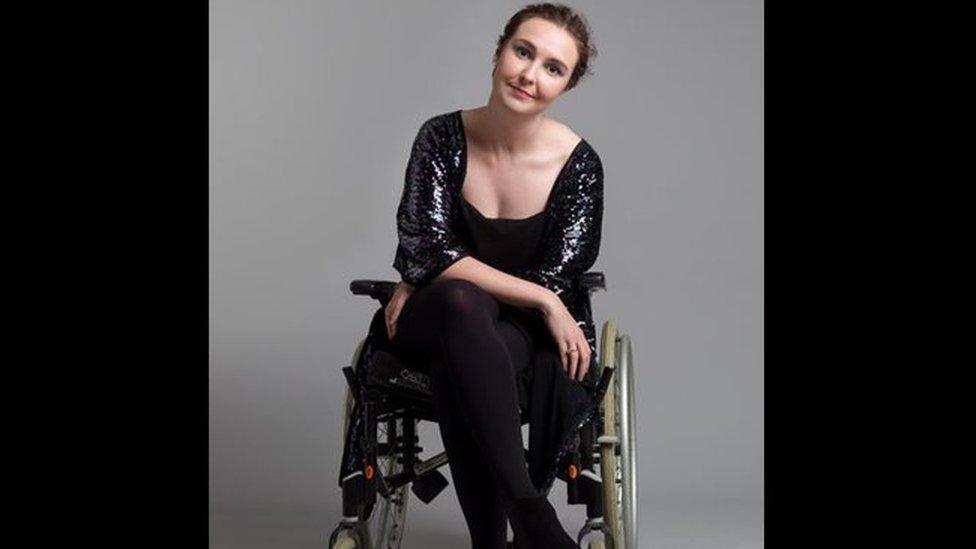Covid: Lockdown and the cost of cancelled physio sessions
- Published

Physiotherapy is often used to treat sports injuries or ease niggles, but for some disabled people it can be essential to maintain the quality and length of their life. Meg Fozzard explores the serious nature of what happened during lockdown when appointments regularly had to be cancelled.
"It will speed up the decline and shorten my life." These are very blunt words from Jack, not his real name, who believes his health has been impacted by having had far fewer physio sessions during lockdown due to the reduced service.
The 31-year-old has Spinal Muscular Atrophy (SMA), a genetic condition characterised by severe weakness and wasting of muscles.
Living with this progressive condition means Jack has had a lifetime of regular physiotherapy and occupational therapy to keep his body working and maintain muscular strength.
He says: "It meant I could do simple things for myself, such as lifting a cup, holding my phone to my ear, those little things that are essential to independent living."
But when the pandemic struck, the appointments stopped. He had only one session in 18 months and says that has taken its toll on his body.
Though the disease inherently causes muscle wastage, he believes he has lost strength more quickly than when he had therapies regularly.

What is Spinal Muscular Atrophy?
Spinal muscular atrophy (SMA) is a genetic condition that makes the muscles weaker and causes problems with movement and gets worse over time.
There are several types of SMA with signs and symptoms often appearing before the age of two. Two of the four types can impact life expectancy.
It's not currently possible to cure SMA, but treatment to manage the symptoms often includes exercises or surgery to treat problems with the spine or joints. Several drugs are also now available for some young children.
Source: NHS, external

There are four varieties of SMA, each of different severity. For Jack, he says his version "will bring my life to a premature end, but I fear the abilities I've lost may bring this forward more so".
Jack earns a living as an e-commerce marketing consultant but says he's now less able to work and has lost independence.
"It has made work harder and doing things with friends difficult." He tells me that his basic balance has been affected and it is difficult to eat out. He finds it all hard to accept.
"I can foresee there being issues getting regular appointments in the short-term. It will just compound the progress of my disease."
Jane Green, from West Sussex, found herself in a difficult situation when she dislocated her shoulder and couldn't get an appointment with her usual NHS physio.
The 59-year-old has hypermobile Ehlers-Danlos syndrome which typically causes this kind of regular joint dislocation, effects connective tissue in the body, and can also bring about dental problems, chronic pain and migraines.

Like Jack, before lockdown she had regular outpatient appointments with specialists, but when Covid-19 forced everyone to live differently, she struggled with the lack of support.
Jane didn't go to A&E with her dislocated shoulder for fear of getting Covid-19, instead she contacted an osteopath she had worked with previously.
"It was expensive," she told me, and her shoulder didn't get better.
When she started getting bad nerve pain due to daily partial dislocations (subluxations), she had no option but to pay for a private physiotherapist.
Jane, who works with autistic and hypermobile people to make sure their needs are met by the social care and education systems, believes the lack of available physio appointments has been detrimental to her health in the short-term.
Those painful subluxations continue to wear her body down, and, in the longer term, Jane worries she "might have frozen shoulder and other arthritic issues."
Rob Yeldham, director of strategy, policy and engagement at the Chartered Society of Physiotherapy, says during the first and second waves of the pandemic many physios were redeployed to treat Covid-19 patients which created a "knock-on effect" to regular services.
He says, however, that a return to normal, "isn't enough" and that problems from before Covid-19 must be addressed: "We want to go beyond just reinstating services to see real improvements in access, equity and quality of care."
He says prior to Covid-19 waiting times for patients to see specialists were already "unacceptable" and not all services were accessible.
Rob says one way they are trying to improve this is through the creation of the Community Rehabilitation Alliance which consists of more than 50 health and social care organisations who campaign for better access to higher quality services.
While no official figures have been kept on the number of patients impacted by the loss of physio appointments, Dai Davies, Professional Practice Lead from the Royal College of Occupational Therapists, says there has been an increase in people trying to access support.
He tells me cases have become "increasingly more complex" as a result of delays which the pandemic caused.
Referrals and assessments now take longer because patients are "physically weaker and more fragile in their wellbeing".
One way the profession is trying to combat this is through a greater use of technology for remote appointments though Dai says it's understood that this isn't accessible for everyone and face-to-face meetings will still be maintained.

Meg Fozzard: My personal experience

Meg Fozzard raising a glass of wine in California just days before she had a cardiac arrest
This problem of cancelled sessions, virtual appointments and declining conditions is one that I understand first-hand.
The day after I flew back from a family trip to California in 2019, I had a cardiac arrest aged 26.
I was diagnosed with a genetic heart condition which causes a defect in the cells of my heart and also experienced a brain injury due to a lack of oxygen.
My resulting disability impacts all areas of my life including memory, speech and dexterity. It means I can't do everyday tasks like washing my hair and I use a wheelchair to get around.
To reset my body after such a significant event, physiotherapy became crucial.
Before the pandemic, I saw a physiotherapist every three weeks and an occupational therapist every four to help improve my walking and my ability to do tasks like doing-up buttons.
When lockdown began, I was initially given video and telephone appointments. These were tricky - it wasn't the same as seeing a physio in-person who has the correct equipment and it's difficult for them to understand the way your body moves through a laptop.
After that, months went by without contact. It is only recently that my sessions have resumed, but these are at a reduced rate.
Although I didn't lose skills during lockdown, nor did I improve in the way I expected to and it remains a difficult situation I, and many others, are trying to come to terms with.
